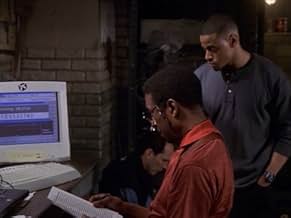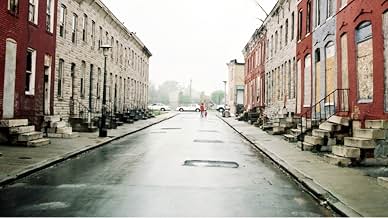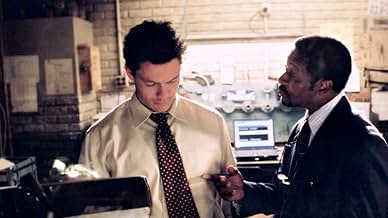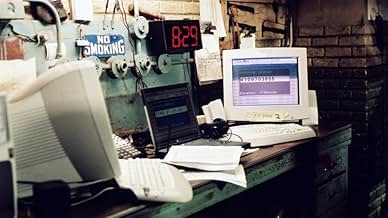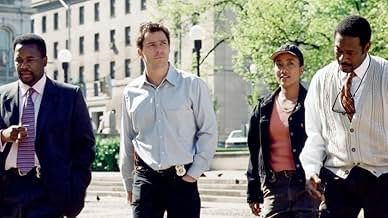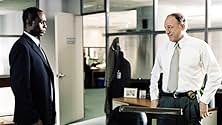The Wire
- Episode aired Jul 7, 2002
- TV-MA
- 59m
IMDb RATING
8.5/10
6.7K
YOUR RATING
McNulty and Greggs ask for a delay in a murder bust in order to preserve the wiretap.McNulty and Greggs ask for a delay in a murder bust in order to preserve the wiretap.McNulty and Greggs ask for a delay in a murder bust in order to preserve the wiretap.
Frankie Faison
- Deputy Commissioner for Operations Ervin H. Burrell
- (as Frankie R. Faison)
Lawrence Gilliard Jr.
- D'Angelo Barksdale
- (as Larry Gilliard Jr.)
Deirdre Lovejoy
- A.S.A. Rhonda Pearlman
- (credit only)
J.D. Williams
- Preston 'Bodie' Broadus
- (as JD Williams)
Featured reviews
The opening of the 6th episode is pretty brilliant... the cinematography masterful, and the writing impeccable. Of course, after the previous episode's cliffhanger, stakes are up here. Still, the series continues to move with a great pace, and with every episode we get to know the characters more and more.
Dialogue is a big factor here, especially in this episode. I can't say that this is an easy series to write, because it isn't. However, it doesn't get any more realistic or raw than this. The performances are even more brilliant here, and we are finally starting to understand other characters that may at first have seemed insignificant.
Dialogue is a big factor here, especially in this episode. I can't say that this is an easy series to write, because it isn't. However, it doesn't get any more realistic or raw than this. The performances are even more brilliant here, and we are finally starting to understand other characters that may at first have seemed insignificant.
A body is found on public display and Daniels fights for future of his detail.
This is a brilliant episode that has everything that makes The Wire so good.
The tone is set by a very impactful opening sequence that is incredibly well filmed and contains quite shocking subject matter.
A particularly gruesome murder drives most of the plot and character development through a number of compelling scenes. A strong theme is characters either facing the cost of their actions or going down paths that are likely to have consequences. This is superbly written into several character arcs such as Omar, Wallace, Daniels and McNulty, who take centre stage in some very memorable scenes. All the actors to excellent work in these roles.
Bill Rawls is more involved in this episode and his character rings very true to what I have experienced in the politics of large organisations, particularly those in the public eye. Aside from this he is very entertainingly portrayed with his contemptuous and combative attitude towards everyone who gets in the way of his clearance rate. John Doman is so good in these scenes you would believe he really is this person. His screen chemistry with Delaney Williams and Dominic West is poetry in motion at times. It helps though that they have fantastic material to work with.
Other humorous moments come from Herc, Carver and Bodie who lament the juvenile system whilst bantering well with each other. Bubs and Johnny are also on good form.
This is one of the best episodes of the show for me as it shocks, informs, frustrates, and entertains with some quite awesome filmmaking.
This is a brilliant episode that has everything that makes The Wire so good.
The tone is set by a very impactful opening sequence that is incredibly well filmed and contains quite shocking subject matter.
A particularly gruesome murder drives most of the plot and character development through a number of compelling scenes. A strong theme is characters either facing the cost of their actions or going down paths that are likely to have consequences. This is superbly written into several character arcs such as Omar, Wallace, Daniels and McNulty, who take centre stage in some very memorable scenes. All the actors to excellent work in these roles.
Bill Rawls is more involved in this episode and his character rings very true to what I have experienced in the politics of large organisations, particularly those in the public eye. Aside from this he is very entertainingly portrayed with his contemptuous and combative attitude towards everyone who gets in the way of his clearance rate. John Doman is so good in these scenes you would believe he really is this person. His screen chemistry with Delaney Williams and Dominic West is poetry in motion at times. It helps though that they have fantastic material to work with.
Other humorous moments come from Herc, Carver and Bodie who lament the juvenile system whilst bantering well with each other. Bubs and Johnny are also on good form.
This is one of the best episodes of the show for me as it shocks, informs, frustrates, and entertains with some quite awesome filmmaking.
Greetings from Lithuania.
6th episode of The Wire called "Wire" was another very solid episode. I liked the reality of the world it shows, and story is picking up with every episode, sometimes even with every scene. Acting was superb as usual but is was Michael Kenneth Williams who stole every scene as Omar which is quickly becoming by favorite character in The Wire.
Dialogs is another key thing I enjoy about the series. It's mostly street language and authenticity is going through the roof here - great stuff.
Overall, a very solid episode in a very solid first season. Definitely will continue to watch it.
6th episode of The Wire called "Wire" was another very solid episode. I liked the reality of the world it shows, and story is picking up with every episode, sometimes even with every scene. Acting was superb as usual but is was Michael Kenneth Williams who stole every scene as Omar which is quickly becoming by favorite character in The Wire.
Dialogs is another key thing I enjoy about the series. It's mostly street language and authenticity is going through the roof here - great stuff.
Overall, a very solid episode in a very solid first season. Definitely will continue to watch it.
Few teasers are as efficient as the one that opens the sixth episode of The Wire: a bloodied body on a windshield in an underdeveloped neighborhood. It's a brutal reminder of how casual and realistic the violence can get in a series like this, without ever being glorified or anything: it's just the way it is in real life.
The body is that of Brandon, Omar's boyfriend, and the murder affects everyone in different ways: Avon is pleased, and asks Stringer to give some extra cash to the boys who spotted Brandon the previous night and made it easier to kill him; D'Angelo's friend Wallace, who indirectly helped with the hit, feels bad about what happened and just can't get over it; the cops predict the war between Omar and Barksdale's crew will get worse, and they're right, since Omar reconsiders his "no snitching" policy and identifies one of Avon's men, Bird, as the killer Bunk is looking for. It's not just good news, though: upon learning Barksdale's people are linked to at least three murders, Rawls demands that warrants for Avon's arrest be issued immediately, not caring about the fact that this will nullify all the work done so far.
As has been the case with previous episodes, the most interesting person to watch is Omar, whose interaction with the equally layered and human McNulty constitutes some of the finest dialogue ever heard on TV (the writers' first-hand experience with law enforcement and street life is fundamental here). This chapter is also instrumental in showing how real police work differs from what we see on Law & Order or CSI, at least in some cases: as the Rawls/Daniels dispute proves, cooperation between units isn't a given - some people are in it just for the improvement of statistics. And as the silently tragic final scene shows, the outcome won't be as obvious as that of most cop serials.
The body is that of Brandon, Omar's boyfriend, and the murder affects everyone in different ways: Avon is pleased, and asks Stringer to give some extra cash to the boys who spotted Brandon the previous night and made it easier to kill him; D'Angelo's friend Wallace, who indirectly helped with the hit, feels bad about what happened and just can't get over it; the cops predict the war between Omar and Barksdale's crew will get worse, and they're right, since Omar reconsiders his "no snitching" policy and identifies one of Avon's men, Bird, as the killer Bunk is looking for. It's not just good news, though: upon learning Barksdale's people are linked to at least three murders, Rawls demands that warrants for Avon's arrest be issued immediately, not caring about the fact that this will nullify all the work done so far.
As has been the case with previous episodes, the most interesting person to watch is Omar, whose interaction with the equally layered and human McNulty constitutes some of the finest dialogue ever heard on TV (the writers' first-hand experience with law enforcement and street life is fundamental here). This chapter is also instrumental in showing how real police work differs from what we see on Law & Order or CSI, at least in some cases: as the Rawls/Daniels dispute proves, cooperation between units isn't a given - some people are in it just for the improvement of statistics. And as the silently tragic final scene shows, the outcome won't be as obvious as that of most cop serials.
I'm not going to repeat the other excellent reviews of this episode, but I want to call out the wonderfully understated character moment at the end with Lieutenant Daniels. The entire episode I was questioning why he was reversing course on his reputation as an ambitious "organization man" by fighting to hold off the murder warrants Rawls was pushing for. Even after explicitly telling McNulty that he wouldn't do it.
I interpreted the last scene as answering that question. The shot lingers with Daniels alone in his office staring at the crime scene photo of Brandon Wright. The brutality of the Brandon's murder must have rattled Daniels into fighting for the "right thing" at the cost of advancing his own career. In a manner typical of this show, this isn't communicated by some corny speech, about standing up and fighting for what's right, but just by showing him sitting in the dark, staring at a photo. If you blink, you might have missed it, but it speaks volumes to the depths of this show. 10/10 episode.
I interpreted the last scene as answering that question. The shot lingers with Daniels alone in his office staring at the crime scene photo of Brandon Wright. The brutality of the Brandon's murder must have rattled Daniels into fighting for the "right thing" at the cost of advancing his own career. In a manner typical of this show, this isn't communicated by some corny speech, about standing up and fighting for what's right, but just by showing him sitting in the dark, staring at a photo. If you blink, you might have missed it, but it speaks volumes to the depths of this show. 10/10 episode.
Did you know
- TriviaThis episode contains one of the very few times a musical score is used in the series. It is when Avon is walking through the pit.
- Quotes
Omar Little: Omar don't scare.
- ConnectionsReferences True Romance (1993)
Details
- Release date
- Country of origin
- Official sites
- Language
- Filming locations
- Customs House Ave & Water st, Baltimore, Maryland, USA(Bubbles working at fruit cart)
- Production companies
- See more company credits at IMDbPro
- Runtime
- 59m
- Color
- Aspect ratio
- 4:3
Contribute to this page
Suggest an edit or add missing content

